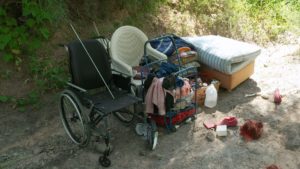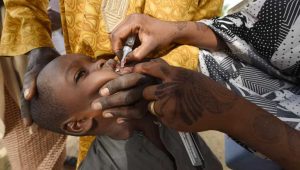25 years ago on April 17, 1999, Serbian forces killed 53 Albanians, including 24 children, in one of the worst massacres of the Kosovo war, in the village of Poklek in the municipality of Drenas. A quarter of a century later, the few survivors remember the horror of that day and live every moment with the pain of losing their family members. They express dissatisfaction over insufficient efforts to bring justice to the country. As colleague Keida Kostreci reports, human rights and international law experts say that when those responsible are not punished, the wounds of the survivors remain open.
The traces of the murders remain unerased in the rooms of Sinan Muqolli’s house and in the memory of the survivors. One of them, Elhame Muqolli, was only 14 years old. She lost her mother, three sisters and two brothers. Her father was a KLA fighter.
“24 children were killed there, from the age of 4 months, 10 months to the age of 14 years and even to advanced ages. We’ve all been civilians, we’ve all been mostly women and children,” she tells VOA from Ohio, where she lives with her family. “A very, very heavy experience, among those noises and among those requests to save all those children and I had no chance, someone left me,” she says.
Hysen Kluna, is another survivor. In one of the days before this difficult anniversary, he speaks to VOA from the house where the event took place.
“They started shooting with a machine gun, then he opened the door and fired a bomb, there was a lot of screaming, terror, then Breneda came in and shot us with a machine gun, I was wounded in the left hand”, he says.
“53 people here, Ymer and Sinan have been taken from us and killed outside, the other 51 inside here. The youngest child was 7-8 months old.”
Sinan Muqolli, the owner of the house and Elhama’s uncle, and Ymer Elshani, a children’s book author who was there as a family friend, were taken out of the house one by one and shot, before the others in the house were killed.
Elhamja, wounded in the leg, managed to get out of the house and thus escaped.
“Even at that moment, I don’t know how that idea came to me, he opened the window and got out of that window. Although I have known for days that there were policemen in the yard as well. The first time I got carried away and fell, the second time I caught the lock and got over that window.”
Teuta Elshani, the daughter of Ymer Elshani, lost her entire family that day: her parents and four brothers. 23 years old, she had been in Pristina and then had gone to North Macedonia, where a good part of those who left Kosovo because of the war were being sheltered. After some time in a refugee camp, she was living with an Albanian family in Skopje.
“On April 17, like every day, I heard the news about what was happening in Kosovo because I had my whole family there, and on the evening news I heard the news about the massacre that happened in the Old Poklek of the municipality of Drenas,” she says to Voice of America from Atlanta, Georgia where he lives with his family.
She hoped for a long time that the news was not true.
“This probably kept me from believing the news I heard in those moments. It was definitely a tough few days after that and I slowly started to realize that it is real news. In June, even when Kosovo was liberated, the movements of people from Kosovo began, and slowly the truth was understood”.
Activists consider the Poklek event extremely serious, where according to the survivors and others who, after returning, found evidence of the crimes, after they were killed, the victims were burned.
“In fact, one of the most macabre massacres caused here 25 years ago, is that of Poklek”, says Bekim Blakaj, director of the International Humanitarian Fund in Kosovo, who has been dealing with the documentation of the victims and the disappeared.
“Until now, this crime has not received a judicial epilogue”, he says.
Elhamja says that she has mixed feelings now after 25 years, because on the one hand, after many sacrifices, Kosovo is free.
3:51 p.m.: “But what is difficult for us is: 25 years have passed and I personally say that there was a re-murder for them. Our country, government after government, have not yet managed to document all these massacres, even sue Serbia, to give responsibility for these crimes it has committed”, she says.
Teuta Elshani says that regardless of Serbia’s stance, of the lack of an apology for war crimes, the Kosovo authorities must do their part.
“I expect my country from Kosovo to document the facts, what happened not only for the Poklek massacre but for all the massacres in Kosovo without distinction and for me this is what troubles me and what I think about because without a file, without an official documentation of the state of Kosovo, nothing can be done in this direction”, she says.
During the war in Kosovo, 10,000 people lost their lives and more than 5,000 are missing. 25 years after it, nothing is known about the fate of over 1,600 people.
Prime Minister Albin Kurti, speaking on this topic on the anniversary of independence on February 17, said that his government is committed to the establishment of justice.
“Our professionals and experts, the entire government and especially the Ministry of Justice are working for everything we have committed to. In Kosovo, there was a genocide in the spring of 1999. This genocide is neither forgotten, nor forgiven, nor atoned for, that’s why justice is important for those who gave the order, for the executors in order to have rehabilitation for the victims and at the same time it is important not to deny the genocide”.
Mr. Blakaj, whose organization has monitored trials for war crimes, says that “the data derived from this monitoring are depressing”.
“From all the courts so far, including the International Criminal Court for the former Yugoslavia, the Hague Tribunal, the courts in Kosovo, so far less than 80 people have been convicted … for the crimes committed during the war in Kosovo.”
For Hysen Kluna, who shows the physical signs that are a reminder of that day, there is an even more urgent reason to act, citing as an example that one of the witnesses, Ramadan Muqolli, has already died.
“Those witnesses who were old are dying, I am 83 years old now, Ramadan was a year behind me, he has seven members left here, and he went and died before me. “Me too, even now, maybe even after a few years, I forget them, but I have them written down”, he says.
Mr. Blakaj says that one of the major obstacles to bringing justice to the country has been the lack of cooperation from Serbia.
“Serbia does not cooperate with the institutions of Kosovo, and by doing so it is offering a large space to those who have committed crimes, to remain unpunished, so they are providing space for impunity”.
Paul Williams, professor of international law at American University in Washington, says that bringing justice to war victims is essential to healing wounds. According to him, it is positive that there have been prosecutions and punishments of Serbian individuals who had committed crimes in Kosovo.
“The disappointing dimension is that the process was not comprehensive and did not continue long enough to prosecute all those responsible,” he told VOA.
Prof. Williams explains that in the legal practice of war crimes justice, when an international tribunal finishes its work, domestic prosecutions begin.
“We have not seen this in Kosovo and Serbia. The Serbian regime has not taken responsibility for the atrocious crimes seriously. And so nothing meaningful has been done in terms of the local prosecution. And Kosovo has not been able to have the jurisdiction or hold such processes”.
Considering that the Serbian forces were responsible for over 80 percent of the crimes, Prof. Williams argues against the tendency to make all parties equally responsible, establishing a moral equality between victim and perpetrator.
“Unfortunately, governments are often told to forgive and forget. But we have always seen that forgiving and forgetting is not the way to reconciliation. It needs responsibility, it needs the truth. Accurate historical documentation is required. And this is not in the past for the victims of atrocities and their families. Their pain is felt today.”
This pain is palpable to Elhame Muqolli.
“It’s never going to be good, when you’re not punished for what you’ve done. And when you don’t apologize. And I don’t know if this is enough. My family members will never wake up, but at least my pain would be relieved.”
But in the memories and legacy of loved ones who are gone, survivors have found a mission and some relief.
“When these tragedies happen, a person has two choices, to give in to the pain or to be strong and move on. I chose this second one, not maybe because I am the strongest person in the world but because in those moments when I have accepted that no one from my immediate family is alive anymore, I have set myself a mission that I have remained alive, I have a debt to be their voice, to continue the family tree and these things have helped me to continue and not give up”.
Part of this mission is the publication of her father’s works of children’s literature. As for Teuta and Elhamen, the families they have created with their spouses are a testament to the continuity of life. These and the memories of loved ones frozen in time.
How was your family?
“A very happy family. When I remember that part, my smile may return. Many of us have been connected to each other. Every organization we have been together. We have done everything together. Even today, she keeps me alive, the good memories”./ VOA
























